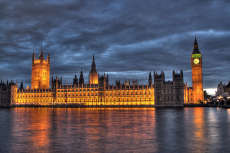
The UK Parliament is the supreme law-making body in the country and consists of three parts: The House of Commons, The House of Lords and the Crown (Queen Elizabeth II).
Members of Parliament (MPs) are elected representatives of the people who sit in the House of Commons, the lower legislative chamber (the upper chamber being the House of Lords). The United Kingdom of Great Britain and Northern Ireland has 650 MPs in total and the vast majority of them belong to a party. The majority (329 of them) are from the Conservative party, just over a third of them are from the Labour party (229) and much of the rest are from the Scottish Nationalist Party (54).
Because the Conservative party has the majority of seats, they form the government, with their party leader as the Prime Minister, whilst the Labour party, with the second highest number of seats is the leading opposition party, with their party leader as the Leader of the Opposition.
MPs from the party in government can be chosen by the Prime Minister to become government Ministers. They can either head a government department, such as the Home Office, the Health Department or the Department for International Affairs. Or they can be put in charge of a specific policy matter, or matters, within a government department, such as the Minister for Immigration in the Home Office or the Minister for Universities and Science in the Department for Business, Energy and Industrial Strategy.
Some MPs are voted in as Speaker or Deputy Speaker of the House, who take charge of the many debates which occur in the House of Commons every day of the week. They have to remain strictly politically neutral and are not allowed to vote on motions or legislation in the house. They have the power to decide when MPs are allowed to speak and tell MPs to be quiet when they are talking over another MP or when they are making too much noise (MPs are not supposed to clap in the House of Commons and so many Members of Parliament resort to jeering or making other sounds in order to express their disdain or support for something, or someone).
Others in the governing party become Parliamentary Private Secretaries. That is, they are made an assistant of one of the Ministers by that minister’s appointment. As the UK Parliament website states: “They often advise the Minister on the state of parliamentary or party opinion, and act as a two-way channel of communication between the Minister and backbench MPs.” They are the eyes and ears of the Minister in the house.
MPs in the largest opposition party can be appointed shadow ministers by the Leader of the Opposition. They are supposed to act like a government in waiting, presenting themselves as a credible alternative government to the electorate. Shadow ministers are supposed to scrutinise the policies of their equivalents in government and, hopefully, lay out better ones. So the Shadow Brexit Secretary, Keir Starmer, is expected to hold to account the decisions made by Brexit Secretary, David Davis.
Image: By Maurice from Zoetermeer, Netherlands (The British Parliament and Big Ben) [CC BY 2.0 (http://creativecommons.org/licenses/by/2.0)], via Wikimedia Commons

0 Comment:
Be the first one to comment on this article.